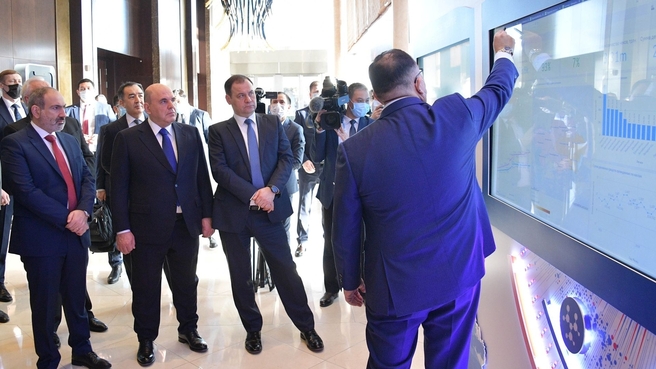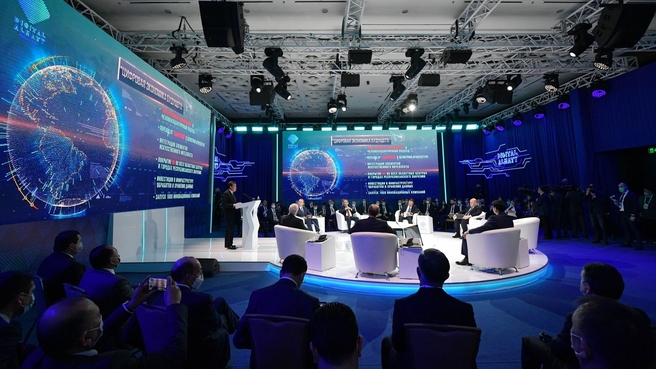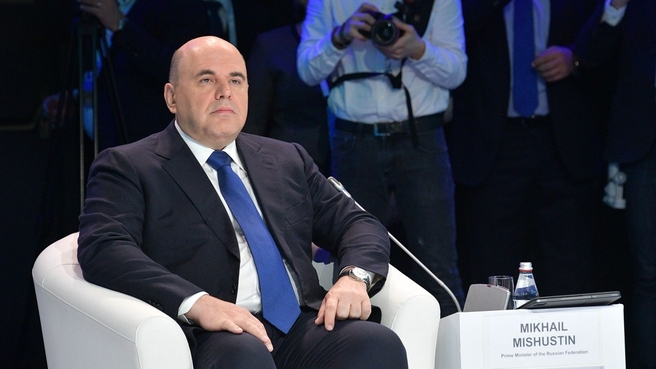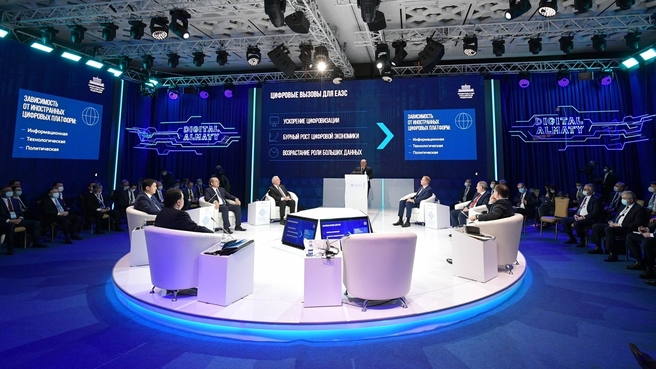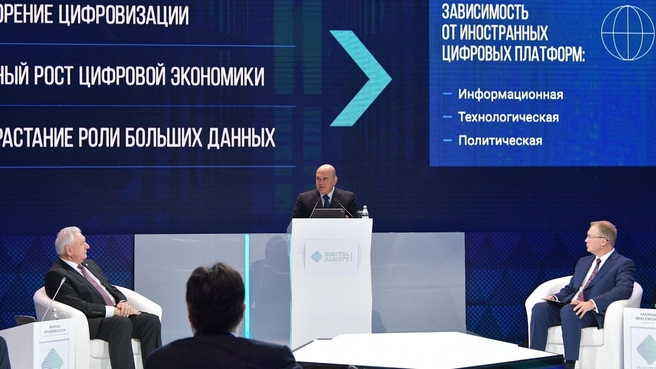The Prime Minister made a speech at the plenary session of the forum titled: “Digital reset: leap forward to a new reality.”
Visiting an exhibition of digital projects
Before the plenary session, Mikhail
Mishustin and the heads of the delegations taking part in the forum watched a
presentation and visited an exhibition of digital projects.
Mikhail Mishustin’s remarks at the plenary session of the forum:
Mikhail Mishustin’s remarks at the plenary session of the Digital Future of the Global Economy forum
Heads of state and government, colleagues, forum participants,
I would like to thank Mr Mamin for the brilliant organisation of this forum, as always. Taking place at a crucial time, this forum focuses on the key challenges of digitalisation. It is such a wonderful tradition, to hold this forum at the onset of the year in Almaty and to openly share opinions on how we can harness digitalisation to the betterment of our countries and the integration processes in the Eurasian Union.
Only a year ago now, we spoke at great length about consolidating the efforts of the Union members and yet, we did not have the slightest idea of what was just around the corner. Nobody could ever have predicted how fast our world would change.
I would like to show you a short video. Please.
(Video plays)
Governments of the five (and other countries as well) had difficult decisions to make on shutting down borders, companies, social and education facilities, on introducing lockdowns, restricting people’s movement and contacts.
We did everything we possibly could to prevent the spread of the virus and to protect our citizens’ lives. It was very important to continue providing people with public services without exposing them to the infection.
Digital solutions became the bridge connecting society together during self-isolation. It was a new challenge for the country and we were ready for it.
At a meeting of the Supreme Eurasian Economic Council in December 2020, President Vladimir Putin said: “All of us saw for ourselves that it is highly important to use advanced information technology, given the current situation. They largely made it possible for government agencies and virtually all industries, education and healthcare to operate normally.”
Thanks to the level of digital development achieved by government agencies of the Russian Federation before the pandemic, we were able to promptly develop and also launch platforms that were widely sought-after during that time.
These new online services, which were created in an everyday life and business environment, made it possible to provide digital services regardless of whether the user was at home or abroad.
We now have an entire set of modern digital services that address the challenges posed by the pandemic.
Colleagues, we are united by the desire to form common markets for goods, services, capital and labour within the Union. Of course, our common goal includes modernisation, cooperation and better competitiveness of our respective national economies.
We fully support President of Kazakhstan Kassym-Jomart Tokayev’s position whereby comprehensive digitalisation must become the driving force behind growth in the EAEU countries. So, we must come up with an answer to the question of what this will be based on. This is what Mr Golovchenko and speakers before him talked about in detail.
The pandemic accelerated digital transformation and exacerbated related strategic challenges and threats. Countries that do not have proprietary digital platforms run the risk of falling into information, political and economic dependence on other countries’ digital solutions.
I absolutely agree with the idea that the Eurasian Council should provide our countries with this opportunity and help us benefit from a large-scale economy, while developing our common digital platform and, of course, preserving national sovereignty.
Last year, the five countries made known their desire for greater cohesion, which was facilitated by taking effective joint measures to counter the spread of the coronavirus, as well as adopting common strategic guidelines for the Eurasian Economic Union to 2025.
The strategy’s successful implementation and deeper integration will, of course, be directly related to promoting our joint digital agenda and introducing electronic services into our lives. This includes creating a single labour market, increasing exports and expanding production chains. It is necessary to create proper conditions for fair and transparent trade, to remove infrastructure restrictions and to tap into the transit potential, to conduct a dialogue with the EU, and to continue to harmonise Eurasian integration with China’s Belt and Road Initiative. This can only be implemented on the basis of a common digital platform.
Frankly, what we see in real life is our partners’ wary approach to digitalisation within the five countries’ space. Unfortunately, we can see the attempts to put off the deployment of joint digital platforms and to keep national rules and systems in place. This becomes obvious if you just take a look at the Eurasian Economic Commission’s discussions on introducing medication registration systems, digital vehicle passports, which we also discussed, and product traceability and labeling systems. Colleagues, the lack, rather than availability, of common digital platforms and systems are jeopardising our respective economies.
If we do not create them in order to ensure transparency of common goods markets, it will, in fact, mean restoring customs regulations on our borders. This is what we were trying to check at the door when we created the Union. If we delay digitalisation and unification, including customs administration and other types of control on our outer borders for everyone in the same manner, we will have to reinstate control measures on our internal borders.
Our joint digital platform must focus on improving our life and business environment. This is the only way for the public to see that integration really does work.
The digital platform will help lift barriers that are hindering the formation of a single market for goods, services, capital and labour within the Union.
This is something that definitely needs to be created with regard to the national interests and in synergy with our information systems. This is the only way we can effectively develop our economies together.
Colleagues, to build a digital platform and to benefit from the advantages of big data economies, we need to deal with a whole lot of tasks. First of all, these are legal matters: the legally valid electronic document management in the Union, including the exchange of personal data and its protection. It is necessary to create and also to introduce integrated digital systems of identification of citizens and businesses (we saw amazing Kazakhstan-made solutions today at the exhibition), and finally deal with the issue of acceptance of electronic signatures. I think that the Eurasian Economic Commission could put a bit more effort into these things.
Our country is facing major objectives, and the Russian Federation also supports the initiatives of the Eurasian Development Bank to create mobile apps that will get rid of various barriers that are preventing our people from crossing the state borders of our Union, searching for jobs and getting settled in the Union countries amid the pandemic.
The developed solutions carefully tackle the issues of the trans-border transfer of personal data and compliance with the requirements of national legislation. Participating countries always have a choice whether to join such platforms. This is a careful approach, the aim of which is to strengthen the trust between our countries, which will allow for the creation of more daring digital solutions during the times ahead.
I would like to present you the mobile apps that were created at the initiative of Russia and with support of the fund (we talked about this today): these are Traveling without COVID-19, and Work in the EAEU. I am quite sure that they will both be popular with the users, and also help improve the ties between our countries.
The first app, Traveling without COVID-19, has been available to all citizens of Russia, Armenia and Belarus, as well as for Union citizens who have crossed into Russia through Armenia and Belarus since 1 February. One just needs to download the application, pick an available laboratory for a PCR test, get tested and, upon receiving a negative result via the app, fly to Russia. We hope that Kazakhstan and Kyrgyzstan will also join the initiative in the nearest future, and the citizens of our respected partner countries will be able to come to Russia without too much hassle. Please, the short video.
(Video)
I would like to thank our colleagues here, Nikolai Podguzov and Tigran Sargsyan, for working so speedily and energetically.
The second app, which we have discussed in detail during our meetings, is Work in the EAEU. It helps a person searching for a job in a member country. This is an integrated service that can be used to find vacancies and get all the necessary paperwork done, including receiving a medical insurance. It can also help with finding accommodation.
We expect that the integrated mobile app will comprise the national systems of the digital migration services of our countries. We have already started to work on it to ensure hassle-free entry into the country. And, I believe that it will be a cool, seamless service for all jobseekers wishing to work in our countries. Almost all issues related to jobs and accommodation in Russia, in particular, can be dealt with before a person actually moves and without the use of often unscrupulous agents.
We plan to finish the development of this service at the onset of the next year and we really do hope that other Union states will join it. Then we will create an integrated labour market of our Union, as it is stated in our main documents.
Please, the next video.
(Video)
Friends and colleagues,
The world has entered the digital era, the fourth industrial revolution. Digital platforms are currently the locomotive of the economic growth of the countries that actively use them. The top twenty companies in terms of shared capital are digital giants that collect data (all of the speakers already mentioned this today) and create digital platforms. I am confident that the creation of the Union digital platform will provide us with opportunities to increase the efficiency of our work and GDP, as well as to create a solid base for the Union. Thank you.
